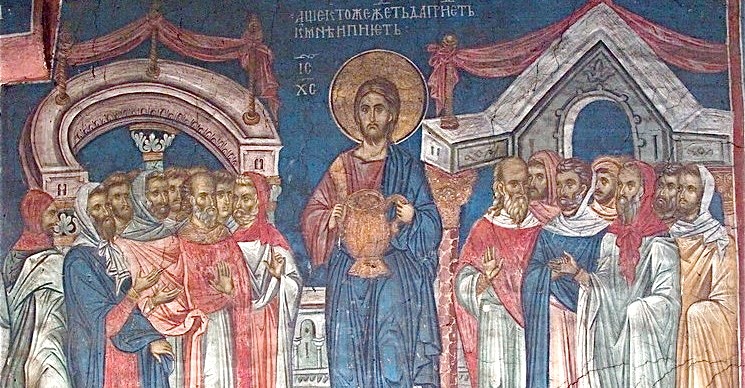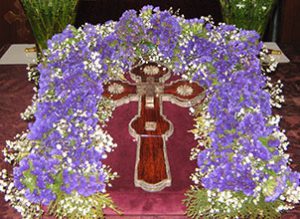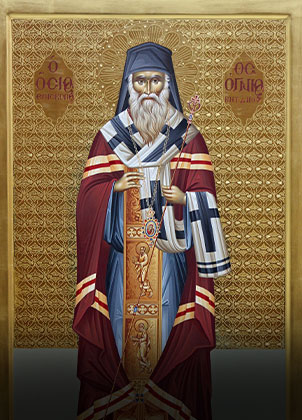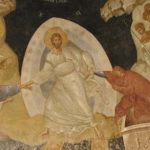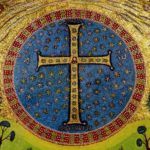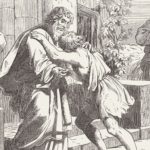Christ is risen!
In the name of the Father and of the Son and of the Holy Spirit.
Brothers and sisters, on Wednesday of this week we will celebrate Mid-Pentecost, i.e. the mid-point between Pascha and Pentecost. Mid-Pentecost is a feast in itself reflecting the grace and joy of both great feasts.
In the troparion of Mid-Pentecost we sing:
“At the mid-point of the Feast, O Saviour, water my thirsty soul with streams of piety; for You cried out to all, ‘If anyone thirsts, let him come to Me and drink!’ O Source of life, Christ our God, glory to You!”
“If anyone thirsts, let him come to Me and drink” – these are the words of our Lord, from the Gospel of St John:
“If anyone thirsts, let him come to Me and drink. He who believes in Me, as the Scripture has said, out of his heart will flow rivers of living water.” (John 7:37)
The Evangelist explains that the Lord “said this concerning the Holy Spirit, Whom those believing in Him would receive”. Thus “water” symbolises here the grace of the Holy Spirit. The “thirst” is, of course, not physical, but spiritual thirst.
Similarly, speaking to the Samaritan woman at Jacob’s well, Jesus Christ says to her (this Gospel reading will be read on the next Sunday): “Whoever drinks of the water that I shall give him will never thirst. But the water that I shall give him will become in him a fountain of water springing up into everlasting life.” (John 4:14)
“If anyone thirsts, let him come to Me and drink”, – The Lord calls upon all to come to Him, but He leaves this on man’s freedom. However, those who decide to accept His call and come to Christ should come with the same attitude as the one who thirsts. We should feel thirst of our soul and realize that nowhere else may it be satisfied.
The same expression we find in the Psalter: “As a deer longs for a stream of water, so longs my soul for You, O God. My soul thirsts for God, for the living God.” (Ps 42,1)
What does our soul long for? – It longs for forgiveness of sins, cleansing, justification, freedom from passions, which disturb and burn the soul. Our soul longs for inner peace, joy, comfort, and love. All these we may find only in God. The Apostle says: “The fruit of the Holy Spirit is love, joy, peace, patience, kindness, goodness, faithfulness, gentleness, self-control” (Gal. 5,22)
Why does our soul not feel this spiritual thirst? – Does it mean that the soul is indeed satisfied and doesn’t need anything? – Of course, not. We don’t feel thirst of our soul because our spiritual feelings have become numb. Our soul is sleeping with a heavy slumber of carelessness. Or, if we feel discontent with our life, we try to satisfy the thirst of our soul with entertainment and worldly enjoyment.
The prophet Jeremiah reproaches us: “My people have committed two evils: they have forsaken Me, the fountain of living waters, and hewed out cisterns for themselves, broken cisterns that can hold no water.” (Jer. 2,13)
“If anyone thirsts, let him come to Me and drink” – says the Lord.
But how will the one who cannot walk be able to come? In today’s Gospel reading we have heard about a paralysed man, who was lying in a porch alongside the Sheep’s pool in Jerusalem. This pool was used for washing sheep before offering them as sacrifice in the temple. Once a year, a miracle happened in this pool: water stirred with no visible cause. This was an Angel of the Lord, who went down and stirred the water. Then whoever stepped first, after the stirring of the water, was made well from whatever disease he had.
The paralytic was unable to walk, therefore every time the water was stirred up, others stepped in before him, and were cured, and he stayed uncured for 38 years. Thus the paralytic for many years was lying right next to the source of salvation, which could miraculously heal him, but he stayed uncured due to his inactivity. The Lord Jesus Christ healed this man by His words: “Rise, take up your bed and walk” (John 5,8).
In the spiritual sense every man may be called a paralytic. Divine grace and help are always at hand, but a man does nothing to reach for it. The soul is paralysed by sin and requires healing from the Lord.
In today’s church hymn we sing: “By your divine presence, O Lord, raise my soul, grievously paralysed by sins of every kind and by unseemly deeds, as you also raised the Paralysed Man of old…” (Kontakion).
It is necessary that we feel the illness of our soul, otherwise we cannot be cured. It is necessary that we feel thirst of our soul, which only Christ can satisfy. He is calling us, promising to satisfy every thirst of our heart. He can water us with water, by which whoever drinks will never thirst. Amen.

